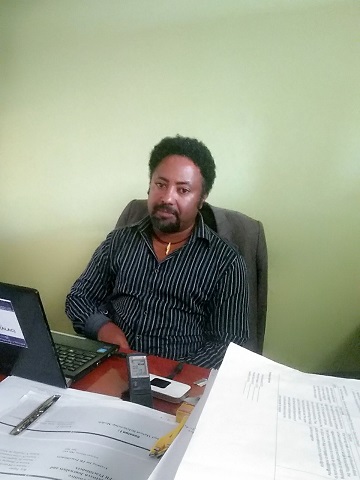
BY GIRMACHEW GASHAW
Today’s Guest Samuel Kasahun is executive manager of Transparency International Ethiopia. The Ethiopian Herald made a short stay with him to learn about the anti-corruption movement that has been underway for the past 20 years and the contribution of CSOs including his organization to stamp out this social menace. Have a nice read!
Ethiopia has been showing its commitment to fight against corruption by establishing an entity called Federal Ethics and Anticorruption Commission. How effective do you think is the struggle so far?
The anti-corruption effort that is run by the Federal Anti-Corruption Commission (FEACC) is not effective or as such did not bear fruit. In my opinion, the commission has not done tasks that make it effective. However, it is accurate to appreciate the commitment of the government as it proactively established the commission at federal level providing the entire mandate in order to combat corruption.
Apart from that failure to organize it in the way it could be effective was one of the challenges. The main problem observed in the struggle against corruption was the influence of high level political authorities. This means the political scenario did not help the institutions to stand on their feet by discharging the mandate given. Even if human beings are running the activities, institutional leaders have played significant role to make their organization effective. If institutions need be effective, the appointment of officials should be merit based. You are not sure whether leaders of institutions are fully partisan or not, however they should not act as a public wing.
Countries that are effective in the fight against corruption have equipped their institutions with high caliber professionals. Unfortunately, the appointments, structural adjustment of institutions are free from any political intrusion. For a long time we heard political loyalty is one criterion to be appointed as a leader of an institution. People are still assigned to a certain position taking their political commitment into account. We were not giving a chance of leading the FEACC and other institutions to the ordinary citizens.
Since its inception, politically affiliated people or people loyal to the ruling party were assigned to lead the commission. The politics had turned the institutions fragile. Even the academic institutions were not free intellectual villages for academicians as they were filled with politicians. Likewise, the federal anti-corruption commission should also be free from any influence and that is useful to strengthen the fight against corruption. Some people considered the FEACC as if it was an institution established to protect and serve the corrupters instead of holding them liable by the law.
At times leaders of the institutions try to exercise the mandate given, the political leaders have taken their own measures on them instead of encouraging and pushing the struggle forward. For instance, previously, the anti-corruption commission was established having all the mandates including prevention and combat.
Awareness raising, discretion and investigation of corruption cases were part of its mandate. Later on, the government has taken the mandate given to FEACC when it started to exercise its power. Accordingly, some of the mandate was given to the Federal Attorney General and Federal Police.
Lastly the Commission resorted to acting like a religious institution by only restricting itself on the prevention methods. This shows the then authorities lacked political determination so as to fight against corruption. Accordingly, the commission also lucks the guts. As a result, corruption should not be rampant throughout the country. On a day to day basis, the crime is aggravating and things are almost on the brink of going out of control. This clearly depicts, the task has not been done properly. Politically appointed leaders collect their own clients in the name of ethnic federalism and political ideology and do whatever they wish creating a network.
The very problem for anti-corruption movement in Ethiopia is, the struggle did not involve strong personalities who prioritized the interest of the society than keeping their own curiosity. Many of the institutions are still filled with politically affiliated people who work for the interest of corrupted people. I think the anti-corruption move is the second priority for the government. Though there are efforts, the anti-corruption movement is not going in the required level.
Still now the problem is political determination. Sometimes, the top government officials may be confused looking at the chain of corruption. As we know all the new government chooses reform instead of making revolution. This political procedure claims the reform government to pay unnecessary sacrifice. The network of corrupted officials who have not lost their position previously held the institutions has diluted the capacity of the incumbent.
Ethiopia has its own constitution. Unless it makes it practical, how could the nation be effective in the fight against corruption?
Misinterpreting the law of the land that governs all laws is an instance of corruption. Corrupted authorities are manipulating and customizing the constitution for their interest. In Ethiopia, the legal institutions should be reorganized in order to strengthen the fight against corruption. If these things are arranged, in my opinion, the institution will be able to discharge its responsibilities.
In our country many legal issues have remained paper tiger. Some corrupt official can violate the proclamation with a single phone call. He bypasses the law and does as he wishes. The legal framework has not been properly protected. In the absence of respecting the law of the land, it is hard to strengthen the fight against corruption.
The country has no problem in signing international conventions such as United Nations Convention against Corruption (UNCAC) and African Union Convention on Preventing and Combating Corruption (AUPCC). Even our domestic laws are strong, but the law enforcement problem is a challenge that can transcend for years. Thus, individuals use the enforcement for their own benefits.
Political commitment is highly required from the government side. We need to declare an anti-corruption revolution. Still many corrupted individuals exist within the government institutions. Since the regime of EPRDF, we have seen some initiatives that can assist the movement against corruption. Though the anti-corruption commission was primarily initiated by the government, it is this government that put a bottleneck not to activate as per its mandate. The commission should be filled with merit based individuals and replicate best practices of countries that are effective in the anti-corruption movement.
In order to strengthen the fight against corruption, the existence of political determinations is quite imperative. You can see better tasks when individuals are assigned based on merits. Here it is good to mention Ethiopian Human Right Commissioners Dr. Daniel Bekele as a good example. If the same thing has been applied in the case of FEACC and if it has a full mandate, we can see better changes.
The Ethiopian government has now established a national committee to lead an anti-corruption campaign. Why do you think is the need to establish this committee?
The initiative of the government should be acknowledged. FEACC can do tasks better than the committee if things are facilitated for it. FEACC, Federal Attorney General and Police are institutions who have given legal grounds in order to stamp out corruption. However, the task done so far had not been effective and that may be the reason for the government to establish a committee at the federal level. The new committee may assist these institutions so as to discharge their responsibility as per the law of the land.
Corruption is being carried out by the thieves who knew the intrigue. They always think one step ahead of the legal procedure. This is one factor that makes corruption unique. Grand corruption is always done by the authorities who have the capacity to manipulate the law. Some people try to preach that there is no grand corruption in the country, however, illicit financial flow and money laundering are some of the issues that are clearly observed. We are now admitting it when the grand corruption manifested itself. On the other hand, petty corruption is now a reality seen in every village. Every service providers door cannot not be opened without money.
The establishment of a new committee tells me how the government is confused with regard to the ever increasing number of corrupters or depicts how things are out of government’s control. However, instead of fighting the social malice by simply forming a committee, it is easy to capacitate the FEACC providing additional mandate.
As things have not been transparent and there is no accountability, one cannot surely predict the thoughts of the government. Fighting corruption with the help of the new committee is not an easy task. The new committee is drawn from high level government officials but does not involve outsiders. The other thing is members of the committee have no ample time to fight against corruption as they are working under a tight schedule. How can they work aggressively is the question any individual can ask. The fight against corruption requires thinking more about it coupled with applying various systems and strategies. It is a task that should be handled independently. Had some of the members been partisan, the committee would bring radical change on the fight against corruption.
FEACC has now restricted itself in corruption prevention activities such as raising the awareness of society towards corruption and so on. How do you evaluate it?
As to my observation and according to a mini research conducted, the awareness of the society towards corruption is somehow increasing. They know the methods that corrupters applied to. On the other hand, condemning corruption and related activities are now decreasing.
These days, corruption is not considered a social taboo. The awareness raising task would focus on loathing the bustles of corruption. However, many corrupters have not been aware that they are committing crimes. There are officials who assume their position is beyond the legal system.
People’s awareness towards corruption is rising but this does not necessarily mean that the level of understanding reaches to the peak. Astonishingly, the society surrenders to corrupters considering that corruption is systemic. The level of exposing corrupters is now decreasing. By and large, corruption is considered a social norm. This emanates from the political systems that have been transcended from one generation to the other.
The high level government officials oppressed the landlords and the society gave a special place for its rulers and prostrated to them. This sort of culture highly exposes the society to give high value to the officials and do as per their words to exercise their right. Even if social identity was expected in connection to Land to the Tiller movement, it failed without succeeding its vision. The EPRDF regime was also developing the aforesaid norm instead of minimizing it. Our society is a society that is not assertive. We simply received things as they are.
Property registration is taken as one method of anti-corruption movement. How effective is it?
We have enough rules and regulations so as to fight against corruption. The property registration proclamation is one. The political client-lism could not touch the corrupters. Who is enforced to register their property? Apart from registering the property of officials, verification of the property is quite imperative. However, the verification task was very complicated as the property at the hands of officials is not correlated.
In Ethiopia there is a proclamation to provide for the disclosure and registration of assets (PROCLAMATION NO. 668/2010). There is no question about the significance of the rule but the implementation is zero. The commission has been striving to make it a reality. As per the information that I have, because it is not been modernized, the task was so arduous. They use a manual document. Now, they are trying to digitize it. We need to touch the untouchable officials who are still making corruption hidden in the shadows.
Does digitization narrow the activities of corruption or modernize it than ever before?
Digitization assists the anti-corruption movement. The very problem here is implementation. As they are operated by human beings, it may be manipulated. They are very decisive instruments and we need to fully transfer to the digital world. We are late to apply the advanced technologies compared to neighboring countries. Those who lead the struggle against corruption need to have political determination.
Our problem is lack of integrity. We are serving the people in the absence of veracity. Poverty and price hikes are pushing factors for corruptors to manipulate laws, procedures and digitization services. Hence, if we properly utilize them, digital instruments are helpful to stamp out corruption.
Your organization Transparency International Ethiopia has been making consultancy and advocacy works for the past 20 years? How many people utilized the hotline arranged to the public?
In the EPRDF regime, CSOs were not functioning well. Had it been an NGO that facilitated everything to do the jobs, Transparency International Ethiopia could assist the fight against corruption. However, as a CSO, it performed less than the expected as the regulation enacted by the EPRDF had discouraged CSOs. The desire of leaders who come and go in the political ladder decides not only the fate of the country but also CSOs like ours.
Therefore, the CSO sector was strangled for a long time as they were considered subservient of the interest of foreign powers. So, we were not able to actively engage in the fight against corruption in full capacity. One of the mandates given for Transparency international is doing advocacy work. We are also assisting policy makers so as to formulate policies and implement the existing laws which are decisive for the society. We also provide free legal consultancy service for those who are abused by the legal entities. However, we could not able to provide full legal assistance for those who seek our support.
Indeed, our service makes many people beneficiary. We also mobilized many segment of the society. Awareness raising and ethics building tasks have also been assisting the fight against corruption. Though we have the capacity to do a great deal as per our mandate, we did not act accordingly due to the less political willingness of the government to strengthen institutions. Following the coming to power of Prime Minister Abiy Ahmed, the CSOs regulation has been amended. It has created enabling environment for CSOs.
Thanks for your time.
It is my pleasure
The Ethiopian Herald 28 January 2023





